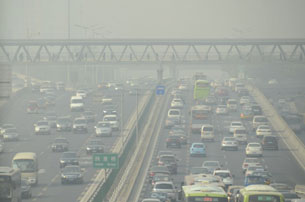Richest, brightest leave China
| Publisher | Radio Free Asia |
| Publication Date | 20 December 2012 |
| Cite as | Radio Free Asia, Richest, brightest leave China, 20 December 2012, available at: https://www.refworld.org/docid/50ed33fe21.html [accessed 4 November 2019] |
| Disclaimer | This is not a UNHCR publication. UNHCR is not responsible for, nor does it necessarily endorse, its content. Any views expressed are solely those of the author or publisher and do not necessarily reflect those of UNHCR, the United Nations or its Member States. |
2012-12-20
Thousands of Chinese are drawn to countries that protect investments and uphold the rule of law.
 Traffic commutes through heavy smog in Beijing, Nov. 21, 2012. AFP
Traffic commutes through heavy smog in Beijing, Nov. 21, 2012. AFP
The past year saw unprecedented numbers of Chinese emigrating to other countries, as China's richest and best-educated citizens increasingly look for a better life elsewhere, a government report said this week.
China already has the world's largest population of overseas migrants at 45 million, and many more look set to leave, driven by pollution and safety concerns, a fanatically competitive education system, and an unpredictable investment environment.
The Annual Report on Chinese International Migration 2012, issued by the Social Sciences Academic Press, said that the trend is a worrying one, as some of China's richest and best-educated people have already left, and will continue to leave.
"The trend is likely to bring losses to the country in terms of assets and talents ... and complicate the development of its substantial economy," the state-run Xinhua news agency commented in a report on Monday.
Concerns for assets
Last year, more than 150,000 Chinese nationals won permanent residency in major immigration destinations, a list headed by the United States, Canada, and Australia.
"Most of these immigrants from China are high net worth individuals, and their investments are mainly focused in real estate, foreign currency, and deposits and stocks, among other fields," Xinhua quoted the report as saying.
"Migration for investment has become a significant part of Chinese people's international migration," the report said.
Germany-based Chinese writer Liao Tianqi said that many rich Chinese prefer to live in democratic, Western societies, because their investments are protected by an independent judiciary and a strong rule of law.
"They are worried that their assets won't be safe in China," Liao said. "They want to find a safe haven for their money, which they worked so hard to make."
"Other factors include the education of their children, the environment, and high taxation, which isn't just taxes but a whole range of random fees," she said.
"On top of that, you have the pollution, the issue of food and medicine safety, all of which make China a place not fit for humans to live," Liao said.
Avoiding scrutiny
Xie Xuanjun, a scholar of Chinese studies in New York, said corruption is also a factor in creating the new class of wealthy Chinese emigrants.
"They got rich from illegal income, or grey money, so they don't want to come under too much legal scrutiny," Xie said.
"While the judicial system isn't used to tackling corruption, crackdowns can still happen."
"After they have made their money through illegal means, they start to feel insecure, and worry about whether they'll be found out," he said.
Political in-fighting and the current leadership transition could also affect the lives of many who have relied on their connections to high-ranking ruling Chinese Communist Party officials to get rich, Xie said.
"For example, those people who got rich because they had good relations with [outgoing president] Hu Jintao may not be very confident about how they'll fare under the administration of [president-in-waiting] Xi Jinping," he said.
"So they are starting to head overseas."
Reported by Xi Wang for RFA's Mandarin Service. Translated and written in English by Luisetta Mudie.
Link to original story on RFA website
